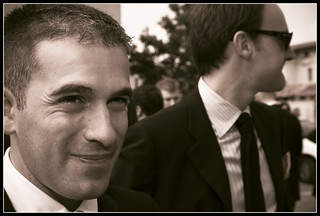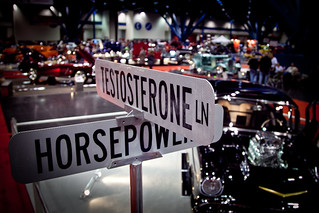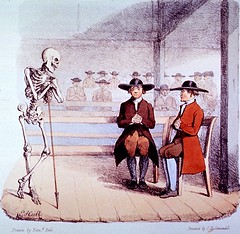Guyside: Don’t sell friendship short
You know how we have little routines that we rely on in conversations? Someone brings up air travel and you have your little shpiel about it. Well, one of mine has always been that women’s relationships are like cats interacting with each other: much sizing up and marking of territory. I’ve also said that men’s friendships get formed like dogs’ — we sniff each other’s butts, then we figure out if the person in question is someone we want to play with.

Male friendship can sometimes be discounted, even by the friends themselves.
It might make a marginally funny line, but I’ve come to believe it sells both men and women short in the friendship department.
I currently don’t really have a “best friend.” There are guys that I’m close with, that I’ve been with through good times and bad times, but not a single person I’d tell people, “oh, you know ?Steve? Yeah, he’s my best friend.”
A few years ago, I had someone I considered a best friend. He and I had begun as colleagues, and had immediately gravitated to each other. My partner and his wife also got along, and we found ourselves as a foursome often, but we also were “guy friends”.
The friendship ended for a number of reasons that probably don’t really matter in this context, and anyway, I don’t think it would be right to go into them. The best way I can say it that I ended it because I was no longer comfortable with being his friend.
That was a few years ago, and since that time we’ve exchanged a few words and seen each other at a few events. It’s led to some awkwardness from time to time, probably on several people’s parts — we still share a number of friends.
And on Sunday night, we found each other at a large surprise party celebrating one of those friends’ 80th birthday, and my ex-friend found a moment to tell me that he missed the friendship. I found myself uncharacteristically incoherent, blabbed out a few loosely connected words, and made myself scarce. It was a very awkward moment for me.
I suspect that were I to reach out to reconnect, it might well be received well by my ex-friend. But even if I did, it might not work out. During the years of our ‘estrangement’, things have changed for me. As I said to someone this week, I feel as if the me he knew, who was his friend, isn’t there anymore. So even if I was willing to remake the friendship, it wouldn’t necessarily be the same friendship.
Another part of me thought about all this and wanted to dismiss the thought process itself as a bit much of a muchness, as too much rumination about a friendship. But I don’t agree with that. And I think that while it can be easy for men to think of our friendships as activity-based or transactional (hey, let’s go running, let’s go out for beers, let’s hit a concert), there’s something more to men’s friendships.
It’s easy to focus on our primary relationship — our wife, our partner, whatever the label is. I think it’s common for men to sometimes forget that there are benefits to ourselves and to the people we care about when we build stronger social bonds with other people, whether we have a best friend or a number of friends.
When it comes to emotional resilience, to mutual support, and to good psychological health, friendship is definitely NOT where you want to put all your eggs in one basket.
I miss what I had. But you can’t go back — or at least I can’t; better to build relationships that can be ones of mutual support and positive regard.
Photo: CC licenced by Flickr user Francesco Rachello
Read MoreGuyside: Who’s MY cougar?
My kindly employer here asked the provocative question “Who’s your cougar?” earlier this week. When you read Liz’s post, you get a sense of the complex set of meanings surrounding the term “cougar”, as well as the minefield of assumptions and sexual mores that surround the people who are identified by self or others as cougars. So I thought I’d take on the question of the cougar from the guyside.
(Cougar not exactly as shown in video)
If you had asked me as a teenager whether cougars were good or bad — I likely would have been heartily in favour of them (if I would have believed they existed, as opposed to being mythological creatures like the Sirens). Anything that would have increased the chance of a little lovin’ would have been okay with me at that point. And being as timid a young man as I was, it would have taken more than the average amount of sexual aggression to turn me into “prey.” But by now, from the perspective of a long-term monogamous relationship, I see the term and those who bear it a bit differently (and, I hope, with a bit more subtlety).
Certainly, I think that there’s a double standard. I’ve seen some men I know move towards dating younger women as they age; it seems as if the age of the women they pursue remains static while their age advances year by year. Most of the time, that behavior is accepted without a second thought. A woman doing the same thing would quite likely not be given the same pass.
It also seems to me that the term “cougar” is very much tied to straight women. Some googling (which turned up some rather, er, explicit results) left me with one example of someone referring to a lesbian cougar. The person singled out? Ellen Degeneres. A quick search of Degeneres found that she had had a relationship with a woman 1o years younger than her, then later married a woman 15 years younger. Not exactly predatory, by my judgement.
What I think as I approach my sixth decade on the planet is this: there’s a big, complicated world out there. If two people find each other, and want to spend some fun-time together, good for them. If they want to spend a life together, good for them too. If you’re both adults (heck, I don’t even much care if three people or four or more are involved; that’s not my thing, but …) and not hurting anyone else in the process, then seek out whatever type of relationship provides you with fulfillment and happiness.
If calling a woman a “cougar” is simply a way to characterize her choice of younger sexual partners, that’s fine. But I think the levels of judgement that seem to accrue to those women make me more than a little uncomfortable using that term. Maybe I’m naive or idealistic, but I think we’re all a little bit more than our genitals.
Read MoreGuyside: Youth by association
 I spent much of Sunday afternoon at a 13th birthday party. Well, a lunch really. The 13-year-old in question isn’t my kid. She and her brother have been part of our lives, and we part of theirs, since birth.
I spent much of Sunday afternoon at a 13th birthday party. Well, a lunch really. The 13-year-old in question isn’t my kid. She and her brother have been part of our lives, and we part of theirs, since birth.
We’re still cool enough to Sophia, and to her brother Cameron, that they’ll willingly hang out with us. A steady diet of junk food and Warner Brothers cartoons during their childhoods must have given us some residual cool factor. All I know is that it’s a source of happiness to hang out with them for me, and I hope for them too.
One thing that’s interesting as I and those around me age: at any given age, you can be younger or older than your years. And one of the factors that make the difference in psychological and physical health is hanging around with younger people.
It’s easy to fall into habits, to assume a certain level of “dignity” or propriety that we think is appropriate for a man of my age. The problem with that is we may be losing our sense of fun, our sense of play.
There’s some research and some anecdotal evidence that suggests hanging out with younger people is good for us. A research study in Taiwan examined the psychological impact of taking care of grandchildren on the elderly, and discovered that those interactions have a “protective effect against depression and loneliness.” If that’s more generally true, it’s important. And a 2004 study paired older adults and emotionally disturbed teenagers. It found that the pairs bonded with each other, and that both teens and seniors experienced benefits from the relationship — the older folks benefited emotionally; the teens, behaviourally.
I know from my own life that spending time with our young friends, as well as our two youngest nephews (just starting school now), is always a boost. Spending time with people in the music industry also helps me forge relationships with many musicians who tend to be younger. Musicians also recognize the value of “playing”, which is a bonus.
And when I cycle in a group, younger people in the group push my physical comfort zone and make me go farther, faster, than I might on my own. When I count up all the interactions and the benefits, I get a lot out of spending time with people who are younger than me, whether they’re four years younger than I am, fourteen, or maybe just four. And perhaps they get something out of hanging out with me! It’s a virtuous circle.
In a couple of weeks, I’ll help celebrate the 80th birthday of a cycling friend. He’s in remarkably good shape for a man of 80. And I think that part of his youthfulness is that many of the friends who will help him celebrate are younger than he is. I’m hoping that in 33 years, the same will be true of me.
Photo: “Young punk and old unionist” CC-licenced by Flickr user Simon Oosterman.
Read MoreGuyside: Getting testy about testosterone
 There’s no doubt that men think about the effects of aging on their bodies. And if there were, a viewing of ads for hair colouring, hair thickening agents, or erectile dysfunction drugs would quickly convince you. You could be a new man!
There’s no doubt that men think about the effects of aging on their bodies. And if there were, a viewing of ads for hair colouring, hair thickening agents, or erectile dysfunction drugs would quickly convince you. You could be a new man!
And as regular Flashfree readers will know, one of the things that’s been touted as a solution to the woes of the aging male is testosterone replacement therapy.
The basic idea is that men may have a condition that’s referred to as “Low T.” And so a gel, a patch, a tablet or an injection may bring you back to a more energetic, athletic, virile condition. The pitch has been made more and more convincingly, by all accounts: an Australian research team found that the sales of testsosterone treatments went from $150 million in 2001 to $1.8 billion in 2012.
That’s a 1200% increase. The Australian research indicated that the amount of testosterone being prescribed far outstripped the incidence of “male menopause” or andropause. So what’s going on? Oh, I suspect there’s a generous helping of vanity involved here.
But if it were simply a matter of making men feel better about themselves, it would just be a waste of money. A growing body of research evidence is suggesting that treating Low T may increase the risk of cardiac events. The most recent, an article from the open-access journal PLOS ONE, suggests a substantial increase in the risk of myocardial infarction — what we normally refer to as a heart attack — with the use of testosterone, for men under and over 65 years of age.
I’m sure there are men with diagnostic criteria that would make testosterone therapy an appropriate choice, with a careful calculation of the risks and benefits. But if my hair’s getting a little thin, if I’m not feeling as “macho” as I once was — do I really want to be using a hormone supplement that could put me at risk of a heart attack?
It’s very easy to succumb to marketing-based pitches that appeal to what we think we need as men. But it’s important for us to not jump at those pitches without thinking about the risks and the benefits carefully.
There was a rush to use estrogen and progesterone to help women with symptoms of menopause several years ago, and then a panic when those therapies were associated with increased cardiac symptoms.
I’m no doctor, and I’m certainly not saying that nobody should be using hormones in this way. But I do think that we should think through ALL of our medical decisions and ensure we’re taking the risks seriously.
(photo: CC-licenced image by Flickr user Ed Schipul)
Read MoreDeath be not complacent
 Pete Seeger died last week. He was 94. As a lover of folk music, it’s hard to imagine someone who more powerfully embodied that genre’s ideals. A man of principle who believed the best thing to do with a song was share it, a man who used his music like a well from which to draw joy.
Pete Seeger died last week. He was 94. As a lover of folk music, it’s hard to imagine someone who more powerfully embodied that genre’s ideals. A man of principle who believed the best thing to do with a song was share it, a man who used his music like a well from which to draw joy.
What struck me as I read the many tributes to him in emails, tweets, and Facebook posts was that death is different as you age. I lost an older brother at 13. That was a shattering experience. In my 20s, I can only remember going to one funeral – a young man who died tragically in a roller-blading accident. It was a poignant service.
By now, I’ve lost tons of uncles and aunts from my long-lived clan; too many. The most recent was just last week, my aunt Stella. A few cousins too, and of course, my dad. And outside of the family, I’ve lost friends, primarily to cancer, that blind killer of the old and young alike.
I have had more encounters with death than I’d prefer. But what once was momentous has become an event that is sad, inevitable, and far more anticipated than before. So what should we men of a certain age learn from death?
Don’t sit on things. When I was diagnosed with bladder cancer, it was caught early because when I saw blood in my urine, I DID something about it. Ignoring symptoms is rarely a good idea.
Acknowledge your own mortality. Yes, you feel good now. It’s easy to tell yourself — seriously — that you’re bulletproof. But be realistic. Bodies change, fitness changes; if you are an average guy, you’re likely not as strong as you were 20 years ago, as fast. Accept it (without giving in and giving up). Set fitness and activity goals that aren’t going to leave you groaning for days afterward or in the ER.
Do stuff now. When I turned 40 and got cancer, it woke me up and I made some changes that I’d idly thought and talked about for years without taking action. It’s always time to do that. Investment guru John Templeton once said “The best time to invest is when you have money. This is because history suggests it is not timing the markets that matters, it is time.” You HAVE time that you can invest in anything you want to do. Right now. Do something.
Think a little bit holistically. No, I’m not suggesting buying a juicer or getting your chakras aligned. But when I was younger, I didn’t make the connection between my body and my mind. Using tools like yoga, meditation, therapy, etc. doesn’t only improve your psychological health. It can make you exercise better and, in my experience, make you enjoy your exercise routine more by deepening your concentration.
Death is inevitable. It’s going to come to all of us at some point, and we will be reminded of that by the loss of friends and family from time to time. But don’t take that inevitability as impending doom; take it as a reminder that with a finite amount of time allocated, it’s up to us to make the most of it.
(photo Creative Commons licenced by Flickr user Leiris202)
Read MoreBalance. I have it. Sometimes.
 In my 20s, I used to work as studio director for a radio morning show. Often, I’d stay up, watch Late Night with David Letterman, and then hit the sack, only to get up and hit the road to be at the station at 5, bright-eyed and bushy-tailed with coffee for the gang. A little later on, I worked at a 24-hour news network, and my shifts were almost always 3 a.m.-11 a.m. or 4 a.m.-noon. I’d come home, do some other work, my partner would come home, and I’d almost always be in bed after 10 p.m. Five hours sleep was fine. In an magazine job, all-nighters were common as we got to production.
In my 20s, I used to work as studio director for a radio morning show. Often, I’d stay up, watch Late Night with David Letterman, and then hit the sack, only to get up and hit the road to be at the station at 5, bright-eyed and bushy-tailed with coffee for the gang. A little later on, I worked at a 24-hour news network, and my shifts were almost always 3 a.m.-11 a.m. or 4 a.m.-noon. I’d come home, do some other work, my partner would come home, and I’d almost always be in bed after 10 p.m. Five hours sleep was fine. In an magazine job, all-nighters were common as we got to production.
If I tried that now, I would implode in a week. And that isn’t always the easiest thing for a man to admit. We’re supposed to be invulnerable, aren’t we? One of the things I’ve noticed as the years have gone on is I can still be as intense as I was in the past (I think!), but that I can’t maintain that level of intensity for same length of time. I attend a music-industry conference each year where part of the deal is attending music sessions that go on until about four in the morning. I can do that, but inevitably there’s a post-conference crash.
Combine the fact that my “energy well” isn’t as deep as it used to be with the lifestyle of a self-employed consultant, where the pace can sometimes oscillate between frenetic and … what now? and you have a recipe for stress.
I have a few things I try to do to combat that stress. I try to keep my sleep habits as regular as I can. I’m lucky in that I rarely have insomnia, so it’s easy for me to stay rested most of the time. That keeps the energy supply high.
If there’s a frenetic period on the horizon, I will try to book downtime to recharge my batteries after the urgency subsides. Better to book it and keep it for myself than to carry on as if I didn’t just complete a herculean task and end up crashing.
And I try to keep my regular appointments sacred. Yoga class, exercise, and the like can sometimes feel like a distraction that I “should” skip “just this once.” But that has an impact down the road. Short-term gain for long-term pain.
It’s not easy to stay energized all the time. But if you can learn — even attempt — to manage yourself a little better, you can perform at a higher level all the time, rather than some roller-coaster cycle of sprinting, and then collapsing.
What are your tips for managing energy levels? Tell me in the comments.
Read More





